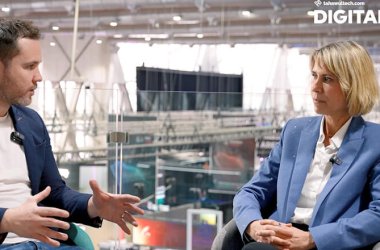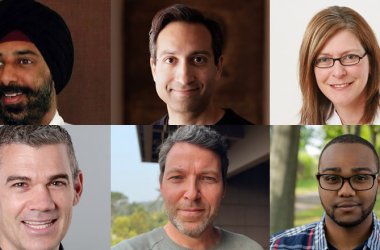
Let me take you on a journey, not into some far-off sci-fi future, but into a tomorrow that’s just around the corner.
Imagine walking into your workplace and finding that some of your “colleagues” are no longer human. They’re not robots in the traditional sense, but autonomous software agents trained on vast datasets, equipped with decision-making power, and capable of performing economic, civic, and operational tasks at scale. These agents write policies, monitor supply chains, process health records, generate news, and even govern our digital interactions.
This isn’t a scene from a movie. A tectonic shift is heading our way, one that will transform how we work, how governments function, and even how communities operate. In this world, digital public infrastructure (DPI) will not be a convenience. It will be a lifeline.
This shift is already progressing in the heart of the Middle East. Ambitious projects like NEOM in Saudi Arabia are exploring how agentic AI can be woven into the fabric of urban life. They aim to build an ecosystem of autonomous agents that redefines how cities are developed and managed.
Sovereignty in the Age of Agents
We like to say, “Everyone has data.” But the real question is: Where is it? Who controls it? Who governs access to it? In a world run by agents, these are not purely technical questions but ones of power, accountability, and autonomy.
A sovereign nation that cannot locate, trust, or manage its data risks losing control.. A government that cannot verify what its own agents have learned, or with whom they are communicating with, is no longer governing.
To survive and thrive in this new ecosystem, DPI must evolve into Digital Shoring: a foundation for sovereign, trusted, and open environments built on four pillars:
Open Data – depends on trust. It requires clear data lineage, verified provenance, and accountable governance. Knowing where your data came from and where it’s going is essential for any system that relies on it..
Open Source Software – because critical infrastructure built on black boxes is neither secure nor sovereign.
Open Standards – because without shared protocols, agents can’t cooperate, institutions can’t interoperate, and governments can’t govern.
Open Skills – because the capacity to read a balance sheet, or audit a neural net, shouldn’t belong to a privileged few.
This is the backbone of an agentic society that is fair, sovereign, and resilient.
Agentic Intelligence: More Than Just Fancy Tools
Let’s talk about what agents actually are – and what they aren’t.
Imagine I hand a company’s financial statement to two readers: a junior analyst and a seasoned economist. Both might understand the numbers, but only one can extract strategic insight. Similarly, agents can read, analyze, and reason. But the quality of their actions depends entirely on the skills they are equipped with. These skills can be trained, acquired, or, most importantly, shared.
In public sector contexts, this presents an extraordinary opportunity. Why should every institution reinvent the same agent? Why can’t the skills of a fraud detection agent used in one department be transferred, securely and ethically, to another?
Just like people share their expertise, we need infrastructure for sharing agentic capabilities across digital institutions. This is where organizations like the UN can help, by setting the standards and helping everyone through the lens of the Global Digital Compact initiative.
From “Sovereign Cloud” to “Sovereign AI Platforms”
Right now, a lot of talk is around keeping data inside national borders. But in the world of agents, that is just not enough. What really matters is where and how models are trained, how they are managed, and how we keep them in check.
We need Sovereign AI Platforms – akin to the way HR departments manage employees: verifying credentials, ensuring alignment, monitoring performance, and enabling collaboration.
Companies such as Cloudera, are developing the scaffolding for such platforms: secure hybrid AI environments, open-source data pipelines, governance-first orchestration layers, and modular LLM serving infrastructure that respects national compliance frameworks. But no company can do this alone. This is a global mission.
Open by Design. Governed by Default
Governments around the world are already realising that private AI cannot be built on public cloud monopolies. Digital identity and agent oversight need to be open and transparent, not hidden, ad hoc, or opaque.
So the future must be open by design – in code, in data, in protocols, and being governed by default. From Digital IDs that authenticate not only humans, but also agents and their behavior, to full knowledge graphs that maintain shared institutional knowledge across systems, together with audit trails that document every decision, every inference, every prompt.
This goes beyond technology. It involves creating a new kind of digital society that is designed to empower states, safeguard citizens, and align intelligence with democratic values.
The Path Forward
This transformation will not be easy. It will require bold policy, sustained investment, cross-border cooperation, and, above all, technical leadership grounded in values.
But make no mistake, digital cooperation is not optional. It is the condition for sovereignty in an agentic world. Without it, we are left with silos, vendor lock-in, and algorithmic drift. With it, we build a future where intelligence, human or machine, serves the public good.
So let’s move beyond the buzzwords. Let’s build platforms, protocols, and public goods that are open, modular, and sovereign. Let’s treat agents not just as tools, but as members of a digital society in need of governance, trust, and cooperation.
And maybe, when we look back at today from the vantage point of tomorrow, we’ll remember this moment not as a crisis, but as the moment we chose to govern the future together.
This opinion piece is authored by Sergio Gago Huerta, CTO at Cloudera.





